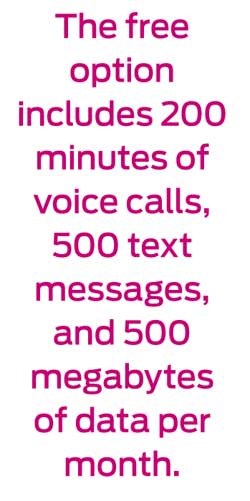Super-Cheap Phone Plans
What’s your monthly cellphone bill — $70, $80, $90? More? It’s far too easy to drop $1,000 a year on cell service from one of the big four U.S. providers: AT&T, Sprint, T-Mobile, and Verizon. Sure, second-tier players like Virgin Mobile and Straight Talk offer cheaper plans ranging from $30 to $50 per month, but you can do even better. In fact, if you’re willing to make a few compromises, your monthly cellular service could dip below $20 — or cost nothing at all.
Ultra low-cost providers typically aren’t household names: Consumer Cellular, FreedomPop, PureTalk USA, Republic Wireless, and Ting, to name a few. They don’t own their own cellphone towers, but rather lease network capacity from the major carriers. Let’s take a closer look at two of these carriers — FreedomPop and Republic Wireless — to see how they work.
Free … Seriously?
 In one case, yes. FreedomPop uses Sprint’s network and offers a no-frills, no-cost plan. The free Basic option includes 200 minutes of voice calls, 500 text messages, and 500 megabytes (MB) of data per month. If you’re not a big caller or texter, it’s worth a look. The data restriction is pretty tight, though. Say you watch just a minute a day of HD video over your cell connection. That alone would use up nearly all of your monthly data allotment. The free MyFreedomPop app lets you track your voice, text, and data usage right on the phone. You also can earn free data by completing surveys, signing up for free trials, or buying services from third parties.
In one case, yes. FreedomPop uses Sprint’s network and offers a no-frills, no-cost plan. The free Basic option includes 200 minutes of voice calls, 500 text messages, and 500 megabytes (MB) of data per month. If you’re not a big caller or texter, it’s worth a look. The data restriction is pretty tight, though. Say you watch just a minute a day of HD video over your cell connection. That alone would use up nearly all of your monthly data allotment. The free MyFreedomPop app lets you track your voice, text, and data usage right on the phone. You also can earn free data by completing surveys, signing up for free trials, or buying services from third parties.
FreedomPop has two paid cell plans: $20 a month for unlimited voice/text and 1 GB of data per month; or $80/year (about $6.67/month) for unlimited voice/text and 500 MB per month. There’s a Wi-Fi-only option for $5/month too. Over half of FreedomPop customers “don’t pay us a penny, literally,” Tony Miller, FreedomPop’s VP of marketing, told me via email. The carrier’s margins come mostly from upselling added-value services such as international calling and data rollover plans, virtual numbers, and online security tools.
Caveats? You bet. FreedomPop sells a limited number of Apple and Android handsets, which at press time included the popular iPhone 6/6s and Samsung Galaxy S5. If you have a Sprint- or Verizon-compatible phone, it might work on FreedomPop’s service too. To find out, go to freedompop.com/byod.
Hybrid Calling
You know how you’re never more than a few feet from a spider? Well, you could say the same for Wi-Fi, which is increasingly ubiquitous at work, home, and everywhere else we hang out. So why use pricey cell service when good ol’ Wi-Fi can do the job? That’s the logic behind Republic Wireless’ clever cellular/Wi-Fi hybrid network, which jumps from one wireless hotspot to another, but falls back to Sprint’s cell network when Wi-Fi isn’t available.
And, hey, it’s really cheap too. Republic Wireless plans start at $5/month for Wi-Fi-only service, but that’s pretty limiting. (Try making a Wi-Fi call when you’re stranded on a highway in the middle of nowhere.) It’s wise to buy a little cellular action. The Republic Refund Base Plan starts at $17.50/month for Wi-Fi plus 500 MB of data. The 1 GB option costs $25. Free? Nope, but here’s the good news: You’ll get a refund for the data you don’t use. Example: If you’re on the $25 (1 GB) plan and use a little over 0.5 GB of cell data, your bill that month will be $17. The average Republic Refund customer paid just $13.79 in September 2015, the company says.
So how does hybrid calling work? The phone automatically detects public Wi-Fi — say, at the local Starbucks — and posts a small alert on the screen, asking if you want to connect. If you choose to, the browser pops up and takes you to the Wi-Fi provider’s login page. Since Republic’s “captive portal technology” saves this information in your phone’s memory, you’ll typically only have to log in once, although this varies by hotspot.
Bad news: If you’re an iPhone user hoping to switch to Republic Wireless, fuhgettaboutit. The service supports a small number of (very good) Android phones from Motorola, including the Moto E, G, and X models. But since Apple doesn’t let third parties fiddle with its iOS mobile software, Republic’s hybrid scheme isn’t iPhone-friendly.
Other Cheapskate Options
- Consumer Cellular offers several low-cost plans designed for seniors who don’t use their cellphones often. Example: $15 for 250 voice minutes, plus $2.50 for 300 texts and a measly 30 MB of data. Monthly total: $17.50. (You can mix/match different voice and data bundles to meet your needs.)
- At PureTalk USA, $25/month buys unlimited voice/text and 100 MB of data.
- And Ting has an a la carte pricing system. For instance, if you have one device ($6), and use up to 100 voice minutes ($3), 100 text messages ($3), and 100 MB of data ($3), your monthly bill comes to $15. The average Ting customer bill is $23, the company says.